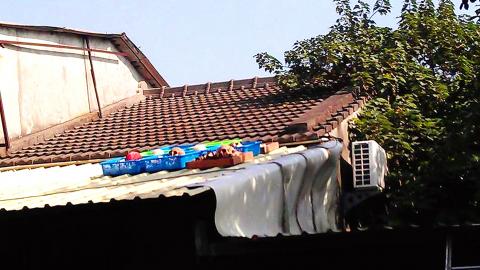Photographs of human skulls and bones laid out on a sunny rooftop in Lugang Township (鹿港), Changhua County, perplexed some netizens and frightened others as they were circulated on social media sites recently.
A Greater Taichung resident surnamed Lee (李) saw the skulls and bones sitting in plastic crates on the roof of a house when he visited Lugang last week. Intrigued by the sight, he photographed the bones and posted the pictures online, generating a tidal wave of commentary.
“This is just awesome. Human skulls are sunbathing on the roof,” one netizen wrote, while others said it was “unbelievable” that skeletal remains were on public display on a street.

Photo retaken by Chang Jui-chen, Taipei Times
Lee later found out that the crates belonged to bone collector (撿骨師) Huang Ming-hsien (黃名顯), who lives across the street.
Exhuming ancestral remains to clean, dry and rebury the skulls and bones is a tradition known as khioh-kut (撿骨) in Hoklo (commonly known as Taiwanese).
Huang said the custom enables the spirits of the deceased to rest in peace by helping the “fallen leaves return to the roots” (落葉歸根).
“In the past, the remains had to be dried out under the sun in the courtyard of the place where the deceased used to live. However, this is now done at a site chosen by the bone collector,” he said.
“Some collectors perform the ritual at graveyards, or in open fields. I do it on the roof of a relative’s house,” Huang added.
“Foreign tourists often come to take photographs of the bones,” he said, adding that his family had a billboard reading “Bone Aftercare” in English made to explain the practice to visitors.
“Tour guides also bring Japanese visitors here to have a look. We are quite used to the curiosity of outsiders,” he added.
Huang, 45, is part of the fourth generation of his family to make a career out of collecting bones.
Huang learned the trade by accompanying his father to work when he was young.
“I was a bit scared in the beginning, but I gradually built up courage until I was able to do it by myself,” he said.
“Bone collecting is an important service and its practitioners are helping others. As long as we remain morally righteous, maintain a good character and don’t do anything unethical, then we have nothing to fear from ghosts and evil spirits,” Huang said.
“Bones are just human skeletons. Everyone has a set, so what is there to be scared of?” he said.
Local residents say they are accustomed to the sight.
“It is just like drying clothing in the sun, no need to be alarmed,” a neighbor surnamed Chen (陳) said.
Some netizens agree, saying that as long as the practice does not jeopardize drivers’ or pedestrians’ safety, people should respect it.

Chinese Nationalist Party (KMT) Chairman Eric Chu (朱立倫), spokeswoman Yang Chih-yu (楊智伃) and Legislator Hsieh Lung-chieh (謝龍介) would be summoned by police for questioning for leading an illegal assembly on Thursday evening last week, Minister of the Interior Liu Shyh-fang (劉世芳) said today. The three KMT officials led an assembly outside the Taipei City Prosecutors’ Office, a restricted area where public assembly is not allowed, protesting the questioning of several KMT staff and searches of KMT headquarters and offices in a recall petition forgery case. Chu, Yang and Hsieh are all suspected of contravening the Assembly and Parade Act (集會遊行法) by holding

PRAISE: Japanese visitor Takashi Kubota said the Taiwanese temple architecture images showcased in the AI Art Gallery were the most impressive displays he saw Taiwan does not have an official pavilion at the World Expo in Osaka, Japan, because of its diplomatic predicament, but the government-backed Tech World pavilion is drawing interest with its unique recreations of works by Taiwanese artists. The pavilion features an artificial intelligence (AI)-based art gallery showcasing works of famous Taiwanese artists from the Japanese colonial period using innovative technologies. Among its main simulated displays are Eastern gouache paintings by Chen Chin (陳進), Lin Yu-shan (林玉山) and Kuo Hsueh-hu (郭雪湖), who were the three young Taiwanese painters selected for the East Asian Painting exhibition in 1927. Gouache is a water-based

Taiwan would welcome the return of Honduras as a diplomatic ally if its next president decides to make such a move, Minister of Foreign Affairs Lin Chia-lung (林佳龍) said yesterday. “Of course, we would welcome Honduras if they want to restore diplomatic ties with Taiwan after their elections,” Lin said at a meeting of the legislature’s Foreign Affairs and National Defense Committee, when asked to comment on statements made by two of the three Honduran presidential candidates during the presidential campaign in the Central American country. Taiwan is paying close attention to the region as a whole in the wake of a

OFF-TARGET: More than 30,000 participants were expected to take part in the Games next month, but only 6,550 foreign and 19,400 Taiwanese athletes have registered Taipei city councilors yesterday blasted the organizers of next month’s World Masters Games over sudden timetable and venue changes, which they said have caused thousands of participants to back out of the international sporting event, among other organizational issues. They also cited visa delays and political interference by China as reasons many foreign athletes are requesting refunds for the event, to be held from May 17 to 30. Jointly organized by the Taipei and New Taipei City governments, the games have been rocked by numerous controversies since preparations began in 2020. Taipei City Councilor Lin Yen-feng (林延鳳) said yesterday that new measures by